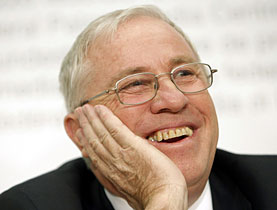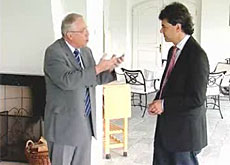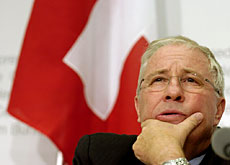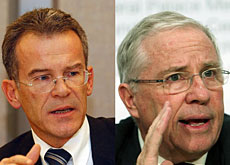Cabinet backs Blocher in prosecutor dispute

The cabinet has come to the defence of Justice Minister Christoph Blocher over allegations he abused his authority in a dispute with the federal prosecutor.
It was the cabinet’s first official response to accusations made by a parliamentary control committee nearly three months ago that Blocher had mishandled the departure of Valentin Roschacher.
Making its findings public on Thursday, the cabinet said it did not share the committee’s criticism of Blocher, but did agree that the Swiss judiciary needed to be reformed.
The statement, which came less than two weeks before parliament is due to elect a new seven-member cabinet, rejects criticism of Blocher by a government-appointed legal expert.
The fact that the justice minister and federal prosecutor did not see eye to eye on various issues first came to the public’s attention in 2004 – a year after Blocher was elected to the cabinet.
Roschacher was under fire from different quarters for his office’s perceived inefficiency in dealings with the United States over an anti-terrorism agreement. And he was accused of being duped by a Colombian informant and drug baron in a money-laundering case.
The justice ministry launched an extraordinary investigation into the way the prosecutor’s office handled the latter.
All of this led to Roschacher’s resignation in 2006 and the start of the parliamentary committee’s enquiry.
In September of this year – only a few weeks before parliamentary elections – the watchdog charged Blocher with having a hand in the prosecutor’s downfall, saying he overstepped his authority as justice minister.
Separation of power
They said Blocher had undermined the strict separation of power between the judicial authorities and the government by intervening with the Federal Court.
During what was a heated election campaign, the Blocher-Roschacher affair took on added spice when it was alleged that the justice minister had acted to protect a banker friend suspected of involvement in the money-laundering case.
But on Thursday, the cabinet absolved Blocher of the main accusations. It said Blocher could not be blamed for abuse of authority since lax supervisory regulations allowed him to make arrangements with a Federal Court judge.
It also cleared the justice minister of any wrongdoing in a separate case involving the deportation to Spain of an alleged terrorist.
The cabinet said it had either already taken on board committee recommendations to reform the laws overseeing the separation of powers, or was in the process of doing so.
Vindication
However, a legal expert appointed by the cabinet to investigate the reasons behind Roschacher’s resignation did not come to all of the same conclusions.
While the cabinet did not see anything wrong with the justice ministry’s involvement in working out the terms of Roschacher’s termination pay, Georg Müller said it was not authorised to do so.
Both Blocher and members of the parliamentary committee interpreted the cabinet’s findings as vindication for their actions.
At a news conference, Blocher reiterated that he had done nothing wrong, while the speaker of the committee, Lucrezia Meier-Schatz championed the fact that the government had agreed to act on the body’s recommendations.
Meier-Schatz also announced her resignation from the committee, saying she was planning to stand in elections to the government in her home canton of St Gallen next year.
swissinfo with agencies
Valentin Roschacher formally stepped down as prosecutor general on July 5, 2006 after coming in for heavy criticism over his handling of various issues.
Roschacher, who took over as federal prosecutor in March 2000, clashed with Blocher on several occasions prior to his departure.
According to the Blick newspaper, in October 2004 Blocher criticised Roschacher for not immediately deporting to Spain Mohamed Achraf, an alleged terrorist. Blocher placed a gagging order on the chief prosecutor and reprimanded him over the affair.
Trouble also flared following the publication of an article at the end of May 2006 in the weekly Weltwoche magazine. The story claimed that a Colombian informant and drug baron had duped Roschacher in a money-laundering case concerning a private banker, Oskar Holenweger.
The federal prosecutor rejected the allegation, saying his involvement was limited to contacts with the Colombian’s lawyer. The justice ministry launched an “extraordinary investigation” into the prosecutor’s office but it was cleared by the Federal Court in September 2006.
According to the recent parliamentary report, a sub-committee was shown documents in August 2007 found by German police in Holenweger’s briefcase. The papers and electronic documents reveal a plan designed to remove Roschacher from office.
The Swiss legislative, executive and the judicial authorities share power according to the constitution.
Parliament as the legislative body debates and decides law, approves international treaties and elects the members of the government. It also oversees the federal administration.
The seven-member cabinet and the administration make up the executive body. They are responsible for implementing law. The government also presents bills to parliament.
The judicial authorities are composed of the Federal Court, the Federal Criminal Court and the Federal Administrative Court. However, there is no Constitutional Court in Switzerland.

In compliance with the JTI standards
More: SWI swissinfo.ch certified by the Journalism Trust Initiative



You can find an overview of ongoing debates with our journalists here. Please join us!
If you want to start a conversation about a topic raised in this article or want to report factual errors, email us at english@swissinfo.ch.